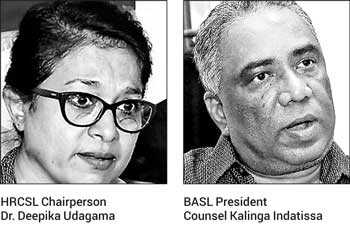Tuesday Feb 24, 2026
Tuesday Feb 24, 2026
Saturday, 5 October 2019 00:10 - - {{hitsCtrl.values.hits}}
 The Human Rights Commission of Sri Lanka (HRCSL) has requested that the Bar Association of Sri Lanka (BASL) co-operate with the institution to address the issue of discriminatory practices of some lawyers against a minority community.
The Human Rights Commission of Sri Lanka (HRCSL) has requested that the Bar Association of Sri Lanka (BASL) co-operate with the institution to address the issue of discriminatory practices of some lawyers against a minority community.
The Human Rights Commission in June wrote to the President of BASL, President’s Counsel Kalinga Indatissa regarding incidents where some members of the bar have refused to appear on behalf of members of the Muslim community arrested in the backdrop of the post-Easter Sunday attacks.
In response, the BASL has said that the Attorneys-at-Law are at will to decide on the representation of clients under the proviso to Rule 5 of the Supreme Court (Conduct of and Etiquette for Attorney-at Law) Rules 1988, and that therefore BASL cannot take action regarding refusal to represent if not taken at an official level.
Responding to the reply from the President of BASL dated 8 August, HRCSL Chairperson Dr. Deepika Udagama said the Commission wrote to the BASL in anticipation of resolving the matter as the complaints were about the conduct of Attorneys-at-Law that had a serious negative impact on the right to equal protection of the law for a certain segment of citizenry.
Noting that positive action by the BASL in this regard would have sent a salutary message and reassured the public, especially the aggrieved parties, that they have the benefit of legal representation in keeping with the highest professional standards, the HRCSL said it will look forward to the co-operation of BASL in the future.
The following is the full text of the letter addressed to BASL President Kalinga Indatissa PC by HRCSL Chairperson Dr. Deepika Udagama:
Dear Mr. Indatissa,
This refers to your letter dated 8 August 2019 sent in response to our previous letters to you on the matter of refusal by some members of Provincial Bar Associations to represent members of the Muslim community arrested in the aftermath of the Easter Sunday bombings. Thank you for the same.
The Commission has studied the above response and wish to point to the following:
1. The Commission is cognizant of its mandate conferred under its present statute, Act No. 21 of 1996. The Commission addressed the above matter to you, as BASL, is the professional body of legal practitioners in the country entrusted with upholding professional standards applicable to its members. You will note that we did not write to you by way of a recommendation subsequent to an inquiry. Indeed, if BASL came within our mandate, we would have summoned relevant officials forthwith in order to examine the complaints received. Instead we requested BASL itself to look into the matter and take corrective action.
Our Commission is firmly of the view that as the National Human Rights Institution in the country we could, and should, engage with professional bodies in the public interest. In this instance we wrote to BASL, as the matters complained of were about the conduct of Attorney’s-at- Law that had a serious negative impact on the right to equal protection of the law for a certain segment of citizenry. We wrote in anticipation of BASL’s co-operation in resolving this matter.
2. You had pointed out that Attorneys-at-Law are at will to decide on representation of clients under the proviso to Rule 5 of the Supreme Court (Conduct of and Etiquette for Attorney-at-Law) Rules 1988, and that therefore BASL cannot take action regarding refusal to represent if not taken at an official level.
A perusal of the proviso points to two specific grounds on which an Attorney-at-Law may refuse representation, viz., where professional independence would be compromised or where acceptance would defeat the best interests of the administration of justice. If indeed Attorneys-at-Law have absolute discretion to refuse representation on a subjective basis, then it would negate the general rule stipulated in Rule 5 which declares that an Attorney-at-Law may not refuse to act on behalf of a party at his or her professional fee.
The Commission raised a matter which clearly pointed to a pattern of refusal to represent aggrieved parties of a particular community, in this instance a community defined by its religion which stood collectively accused due to violent acts of some of its members. Further, in our letter to you dated 25 July 2019 we referred to what transpired at the Magistrate’s Court in Marawila where reportedly even those Attorneys-at-Law who agreed to represent the arrested under the PTA or Emergency Regulations had to face hostility from other members of the Bar. Such a situation is clearly not contemplated under the proviso to Rule 5.
Positive action by the BASL in this regard would have sent a salutary message and reassured the public, especially the aggrieved parties, that they have the benefit of legal representation in keeping with the highest professional standards. This is particularly so at a time when there appear to be deep tensions and divisions among the various communities in the country.
3. The Commission makes its interventions public as our mandate is to promote and protect human rights of the people. The public must know the position of the Commission and action it takes on issues that strongly impact on their human rights. We do not in any manner intend to embarrass or inconvenience the institution or organisation we address.
We trust you will agree that cooperation between HRCSL and BASL on matters relating to the rights of the people under the rule of law would greatly strengthen human rights protection in the country.
We look forward to future co-operation.